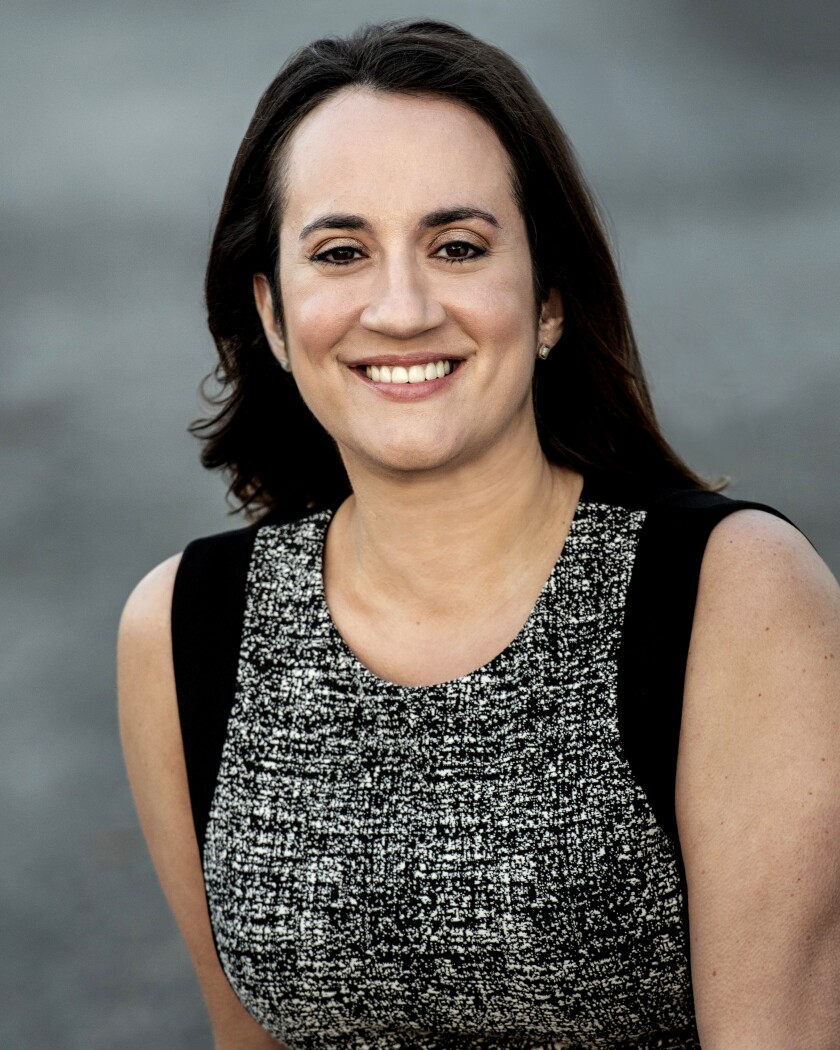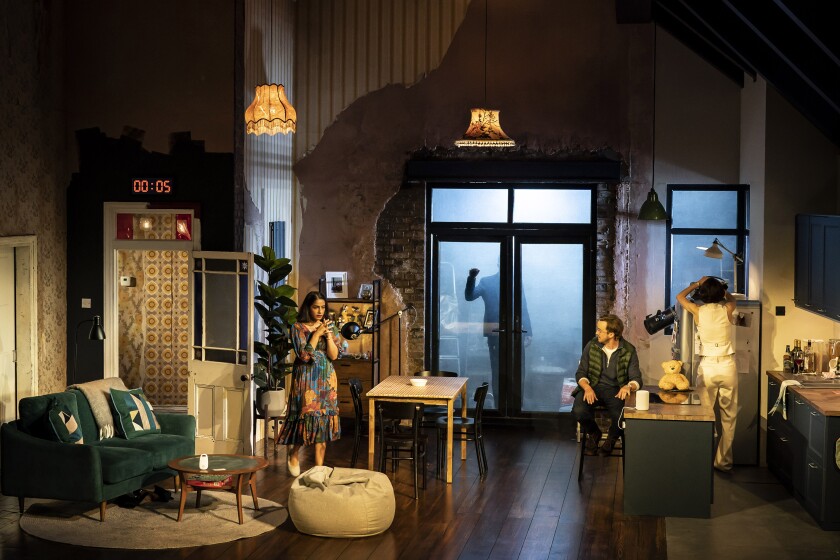It might come as a surprise to those waiting for news about the replacement for Michael Ritchie as artistic director of Center Theatre Group that the official job description is still being written.
No, Gustave Flaubert isn’t putting the final touches on the prose. CTG — the Ahmanson Theatre, the Mark Taper Forum and the Kirk Douglas Theatre — has been undergoing what is being called a “strategic alignment.”
The idea is that before a search can be commenced, there must be a consensus on the organization’s fundamental principles. Flaubert would have recoiled at the business school jargon, but the work was deemed necessary as the institution navigates through some dangerous crosscurrents.
As CTG’s managing director-chief executive, Meghan Pressman said in a phone interview, the theater “has reached out to over 800 folks, both internally and externally, either in a survey or a focus group, to give feedback on past, present and future Center Theatre Group in terms of values, opportunities and challenges.”
Arts Consulting Group, a team of management consultants specializing in the creative sector, was selected last summer to guide the search for the new artistic leader. (It’s a standard move for cultural organizations to seek outside help when steering their way through major leadership changes.) The planning process, Pressman said, “started in earnest in November, December.” Outreach to members of the theater community to clarify first principles happened later in the winter.
This groundwork is meant to inform the search committee, which, according to Pressman, “only recently launched.” The group, composed of 11 members of CTG’s board of directors, including Pressman, is led by Gail Berman, one of the board’s vice presidents and the chairman and chief executive of the Jackal Group, an entertainment company that recently produced the Baz Luhrmann film “Elvis.”
Pressman, who came to CTG in 2019 from the Woolly Mammoth Theatre Company in Washington, D.C., said she expected the job posting will be released later this month in tandem with the news that the search is being led by the consulting group for candidates nationally and internationally. She added that CTG is likely to offer an open house to answer questions about the process.

Center Theatre Group’s managing director-chief executive, Meghan Pressman.
(Teresa Castracane)
“We’re in the thick of it,” she added. “But we’re not so far along that we have any candidates. There’s no formal process to be a candidate at this time.” The hope is that new leadership will be announced this winter, but the timeline is fuzzy.
This deliberate, somewhat sluggish, pace might suggest a lack of urgency. Pressman acknowledged that the strong leadership team that was already in place when Ritchie left obviated the need for an interim artistic director.
Producing director Doug C. Baker, whom Pressman supervises, currently oversees the Ahmanson Theatre, CTG’s largest venue. Five associate artistic directors (Luis Alfaro, Lindsay Allbaugh, Tyrone Davis, Neel Keller, Kelley Kirkpatrick) are focused on artistic programming and new play development at the Mark Taper Forum and the Kirk Douglas Theatre.
“We are not starved for folks being able to select shows and communicate with artists and keep those programs running,” Pressman said. “But the thing we’re predominately lacking in the role of the artistic leader is a singular point of truth.”
Ritchie, who replaced CTG’s founding artistic director, Gordon Davidson, left at the end of last year after a more than 16-year-tenure that many felt was singularly lacking in a defining vision. His departure came somewhat earlier than anticipated for the organization. Pressman said that “to have him here for a longer part of the transition period would have been great, but as soon as he picked the date to leave, he really gave that leadership authority to the associate artistic directors in terms of the season selection they were working on.”
Is Ritchie involved at all in the search for a successor? With a wry laugh, Pressman said, “No. He’s moved on very happily with his next life interest.”
In the last few weeks, I’ve been having conversations with producers and theater artists with deep L.A. roots about the search for a new artistic leader of CTG. There’s enormous interest because many theaters feel that their fates are tied to the city’s flagship theatrical organization.
These talks with community stakeholders have confirmed what my colleague Jessica Gelt reported in May: that our local theaters are facing an unprecedented crisis. Companies are hurting, and artistic leaders are desperate for guidance.
Attendance has not rebounded. As one artistic leader put it, audiences have fallen out of the habit of theatergoing during the COVID-19 pandemic. Even well-reviewed shows are running with large swaths of empty seats.
Re-acclimating to traffic, dealing with the headache of parking and factoring in the high cost of gas are certainly inhibiting many Angelenos’ return to the theater. The anxiety caused by the various surges of increasingly transmissible variants certainly isn’t helping matters, to say nothing of the issue of masks and more elaborate check-in procedures at theaters that are still prioritizing the safety of their patrons.
In the wake of racial and cultural reckonings, artistic leaders are also struggling to figure out how to hold onto existing audiences while doing a better job of creating a more inclusive theatrical environment on both sides of the footlights. The search for an answer is a long-term project, but the financial challenges wrought by faltering attendance, the drying up of emergency government aid and the extra burden of pandemic costs have made institutional survival an additional and increasingly pressing concern.
Pressman shared that she’s been informally tracking data from a list of 20 peer theaters across the nation and has found that the average budgetary gap for next year is about 16%. “We’re all feeling stretched to our limits,” she said.

Center Theatre Group will produce “2:22 — A Ghost Story” from Oct. 29 through Dec. 4 at the Ahmanson Theatre as part of the 2022-23 season.
(Johan Persson)
CTG’s budget for next year is in the mid $60-million range, making it one of the largest nonprofit theater operations in the nation. It is better able to weather these storms than theaters with fewer resources, but the scale of the challenge is becoming ever-more daunting.
“I know some people who would be great at this job who have absolutely said that they don’t want to take it on at this point in their careers,” Pressman said. “We want someone who has the energy, ambition and vision to take it on. And that will self-select to some extent.”
Many people I talked with expressed the hope that CTG will choose a leader who is BIPOC. There’s also a desire to see a woman at the helm of an institution that in the past has skewed heavily male.
The search committee must prioritize a knowledge of L.A.’s unique and uniquely challenging cultural landscape. Heads shake glumly at the thought that someone from New York or London will come in and try to remake CTG in the image of those theater capitals. The one point everyone seems to agree on is that the theater’s communal connections must be restored. To that end, representation at the top matters.
There is also a strong feeling that CTG should be in the business of generating new work, not merely shopping for it on Broadway. Great art, made in L.A., should be the rule rather than the exception.
The 2028 Summer Olympics offers an occasion to showcase what is distinctive about the performing arts in Los Angeles. If CTG is to remain the dominant theatrical presence in the city, it must lead the charge — with a vision that is not imported from elsewhere and imposed on the city.
One concern is that some of the leading local candidates may not have the breadth of management experience to run an operation this large. Pressman allayed this worry by pointing out that because CTG is a big company, there are a lot of resources available to lighten the workload — “folks who can teach, encourage, connect, lift up.” She believes this institutional support will allow the right candidate “to translate their skills at this scale.”
The painstaking process of grounding the search in fundamental principles, Pressman said, is designed so that the board will be in alignment on the values it’s seeking in a new leader. By collectively thinking through what’s needed from an artistic director at this point in the company’s history, she added, CTG will be better able to avoid the flashiest temptations, such as the director who just won a Tony or who has been steadily building a career on Netflix.
But is the board itself doing any rigorous self-assessment? Surely CTG’s declining stature — summed up by one artist as “obscene potential, lackluster recent imagination” — can’t all be attributed to one artistic director. “I would say it is ultimately a focus,” Pressman said, “but it has been a little bit under the radar.”
Everything, however, will be looked at, she assured. Does that include the configuration of CTG as a three-venue behemoth — a structure that some expert observers believe may no longer be sustainable?
“Our mission is something that supersedes our commitment to leases,” Pressman said. “But the property we have current control of allows us to fulfill our mission. I’m really excited for an artistic leader with a vision to come in and play in the sandbox.”
Stay connected with us on social media platform for instant update click here to join our Twitter, & Facebook
We are now on Telegram. Click here to join our channel (@TechiUpdate) and stay updated with the latest Technology headlines.
For all the latest Art-Culture News Click Here
